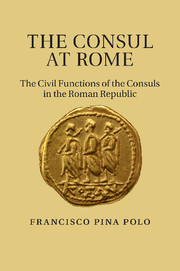Book contents
- Frontmatter
- Contents
- List of illustrations
- Acknowledgements
- Introduction
- PART I THE CONSULAR FUNCTIONS IN THE PRE-SULLAN AGE (367–81)
- PART II THE CONSULAR FUNCTIONS IN THE POST-SULLAN AGE (80–50)
- 12 The supposed lex Cornelia de provinciis ordinandis and the presence of consuls in Rome in the post-Sullan period
- 13 Consular functions from the year 80 to 50
- 14 The consular year in the post-Sullan period
- 15 Conclusion
- Bibliography
- Index of Subjects
- Index of Ancient Sources
- Index of Ancient Personal Names
13 - Consular functions from the year 80 to 50
Published online by Cambridge University Press: 25 October 2011
- Frontmatter
- Contents
- List of illustrations
- Acknowledgements
- Introduction
- PART I THE CONSULAR FUNCTIONS IN THE PRE-SULLAN AGE (367–81)
- PART II THE CONSULAR FUNCTIONS IN THE POST-SULLAN AGE (80–50)
- 12 The supposed lex Cornelia de provinciis ordinandis and the presence of consuls in Rome in the post-Sullan period
- 13 Consular functions from the year 80 to 50
- 14 The consular year in the post-Sullan period
- 15 Conclusion
- Bibliography
- Index of Subjects
- Index of Ancient Sources
- Index of Ancient Personal Names
Summary
In the post-Sullan period, the civil functions the consuls carried out in practice were very similar to those performed by them in previous centuries. Some of the tasks, in particular the religious duties and those regarding international relations of the Roman state, remained virtually unchanged and continued to be completed mainly at the beginning of the year. Understandably, the form of communication of the consuls with the rest of the Roman citizenship continued to be through official edicts as well as their words as orators before the people in contiones. The fact that after Sulla's dictatorship the consuls remained in Rome for a much longer period than in previous centuries resulted in an increase in the number of consular edicts and speeches delivered by the consuls at popular assemblies. The main consequence of the consuls' presence in Rome during the entire year (or most of it) was their conspicuousness on Rome's political scene, their participation in day-to-day politics, in the senate or public debates, in the making of big or small decisions: in short, in the daily management of the community. Without a doubt, one of the most significant changes from the pre-Sullan period was the greater importance that the consuls began to have in the legislative field.
- Type
- Chapter
- Information
- The Consul at RomeThe Civil Functions of the Consuls in the Roman Republic, pp. 249 - 315Publisher: Cambridge University PressPrint publication year: 2011



